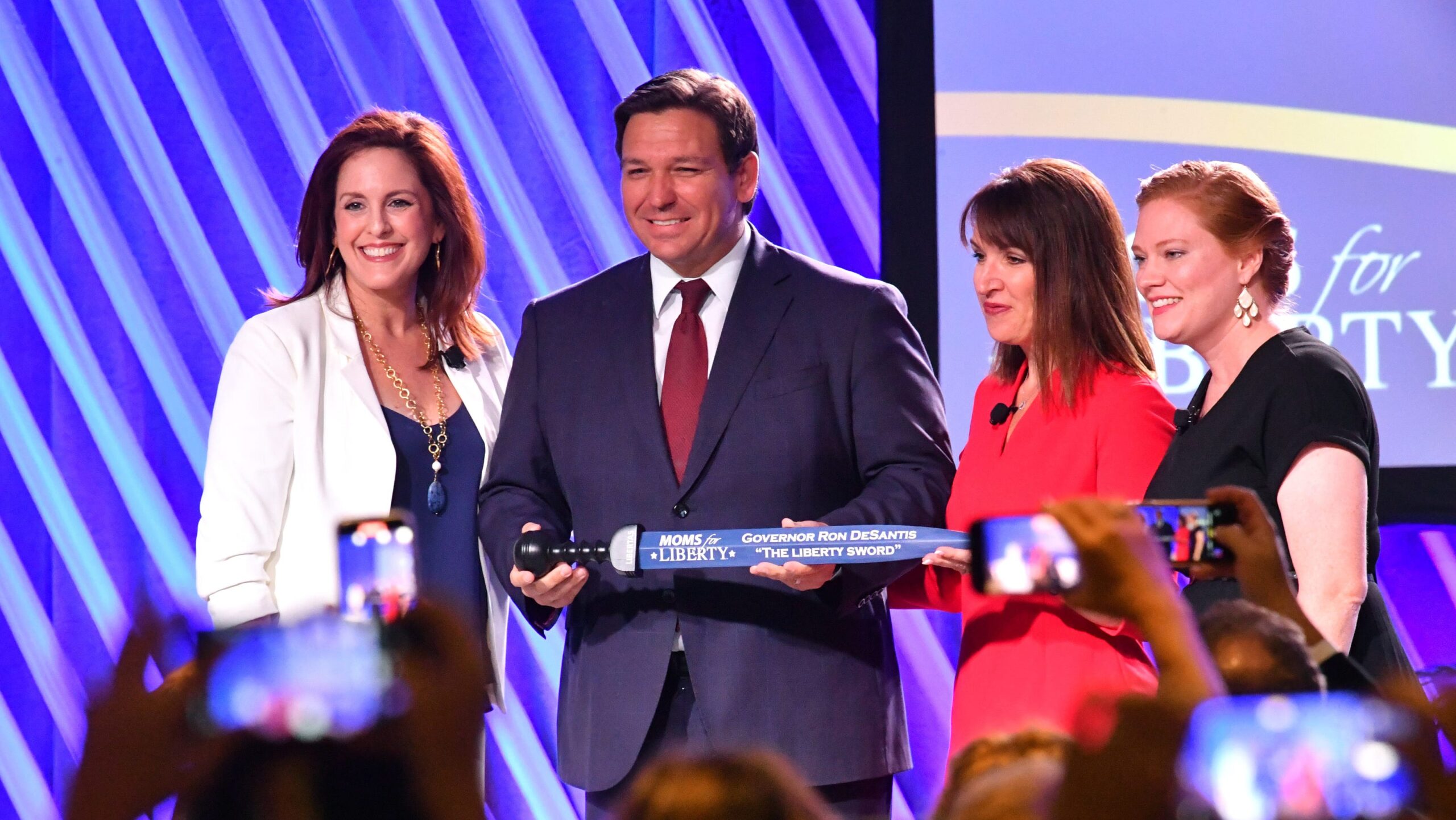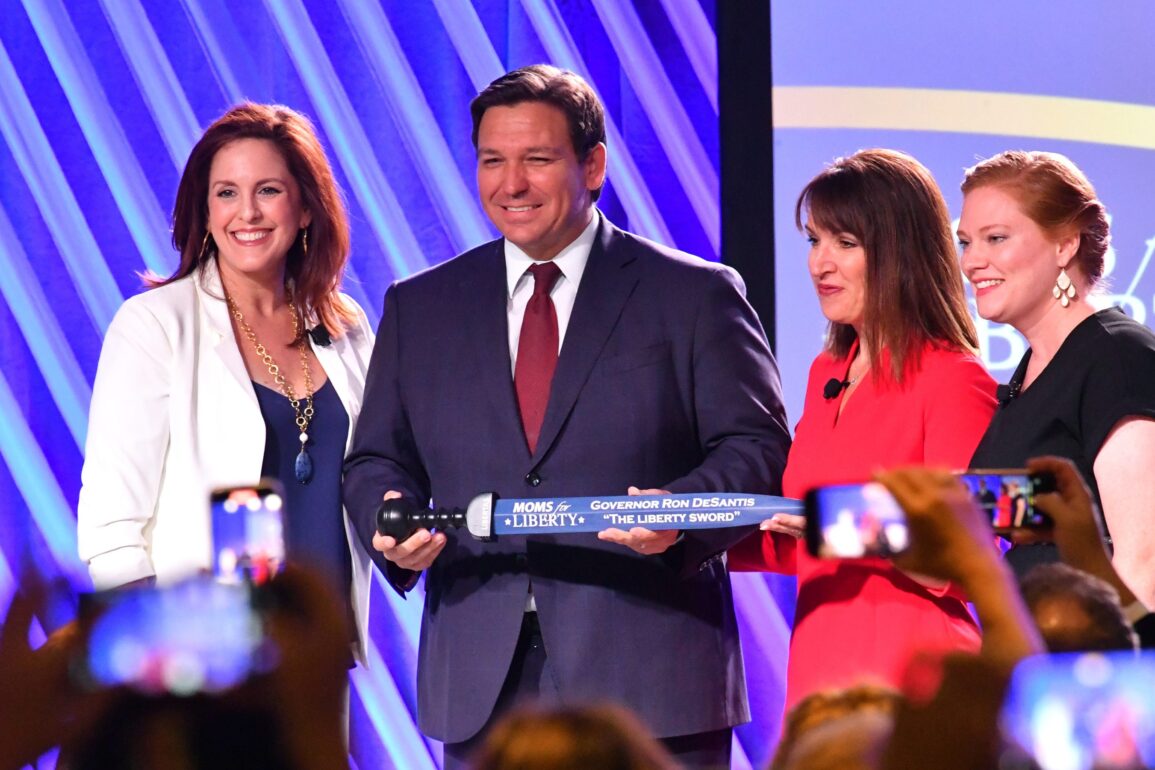
On today’s episode of the 5 Things podcast: Moms for Liberty hears from GOP candidates
USA TODAY National Political Correspondent David Jackson reports from the Moms for Liberty conference and explains what role they may play in the lead-up to the 2024 election. Plus, a manhunt continues after a Baltimore shooting, a Midwest drought may affect food prices, USA TODAY National Political Correspondent Phillip Bailey looks at the state of racism in America, and some states are legalizing raw milk.
Podcasts:True crime, in-depth interviews and more USA TODAY podcasts right here
Hit play on the player above to hear the podcast and follow along with the transcript below.This transcript was automatically generated, and then edited for clarity in its current form. There may be some differences between the audio and the text.
Taylor Wilson:
Good morning. I’m Taylor Wilson and this is 5 Things you need to know Monday, the 3rd of July 2023. Today, a closer look at the Moms for Liberty and their tie-ins with GOP presidential candidates. Plus, a manhunt continues after a Baltimore shooting, and we look at the state of racism in America.
♦
The Moms for Liberty held a national summit last week through Saturday in Philadelphia as the group increasingly becomes a part of the 2024 political picture. But who are they, and which GOP candidates are they influencing? I spoke with USA TODAY National Political Correspondent David Jackson to learn more. Thanks for hopping on the show, David.
David Jackson:
Hey, thanks for having me.
Taylor Wilson:
So David, can you just start by explaining who the Moms for Liberty are?
David Jackson:
It’s one of the newest and most active activist groups on the scene, at least in Republican politics. It’s two school board members from Florida who started this movement back in 2021, and they claim to represent parents who were upset about the way education is being conducted in the United States and in their communities. It basically started during COVID because if you remember, the COVID restrictions included lockdowns of schools. There was a rising number of parents who were complaining about some of the things they were hearing their children being taught. They were complaining about transgender policies in schools and there were basically a lot of complaints about the way the whole thing was being conducted under the lockdown. So these two women from Florida who were school board members in that state decided to start a political organization to combat this situation.
Taylor Wilson:
And David, you’ve attended this Moms for Liberty Convention in Philadelphia. What’s it been like and who have been some of the major speakers?
David Jackson:
It’s a pretty traditional thing for a lot of Republican interest groups. The only difference is that we usually attend events like this from longstanding organizations like CPAC for example. They’ve been around for more than 40 years. Or the Faith and Freedom Coalition last week. That’s a group that’s been around for 30 years. This group is only two years old, but they had panels, they had special guests, they had training sessions for dealing with the media or fundraising and campaigning and things like that. But most especially, they heard from three major presidential candidates. And those were Donald Trump, Ron DeSantis and Nikki Haley.
Taylor Wilson:
And how did the comments from Trump, Haley and DeSantis compare?
David Jackson:
Well, DeSantis was very well received. As I mentioned, this organization started in Florida and the Moms for Liberty organization worked with him closely during his recent legislative session. He pushed a lot of legislation that they wanted, so he was very well received. And Trump was very well received because he’s glommed onto the issue as well.
Taylor Wilson:
And David, do you see Moms for Liberty and the movement associated with it as being something very much of this moment, or do you think that it can continue to pick up steam and be a huge factor in the buildup to the 2024 election?
David Jackson:
They’re still in the building phase, at least with among Republican politicians. I mean, they’ve been a major force in a lot of primaries, in a lot of states. They’ve taken over several school boards across the country and they’ve demonstrated the ability to produce votes. So as long as they keep doing that, they’ll be very important, at least in Republican politics. Now, how well they might appeal in a general election, I don’t think we really know.
Taylor Wilson:
And I mean, you mentioned DeSantis. Would you say that he’s the candidate that has the strongest support from them so far?
David Jackson:
I would think so, but there was a lot of Trump people around this weekend at this convention, so it’s going to be a very close contest.
Taylor Wilson:
All right, David Jackson, great insight here. Thanks so much.
David Jackson:
Thank you.
♦
Taylor Wilson:
A manhunt continues this morning after multiple shooters opened fire at a crowded block party in Baltimore yesterday. Police said an 18-year-old and 20-year-old were killed, while another 28 people were injured, two of whom are in critical condition. Baltimore Mayor Brandon Scott said to those responsible, “We will not stop until we find you and we will find you.” He also called for accountability at every level of the illegal gun trade. The violence comes as the city and gun violence prevention organization, Brady, are suing Polymer80, the largest manufacturer of so-called ghost guns in the country. The suit accuses the company of fueling Baltimore gun violence. Ghost guns are untraceable firearms that can be bought online and assembled at home. Baltimore police did not reveal the type of firearms used in yesterday’s shooting.
♦
Is the western water crisis spreading? Heavy winter snows have temporarily eased the well-documented water situation in places like Colorado and California. But now Midwestern farmers in the country’s bread basket are worrying more about their crops as drought gets worse across Ohio, Missouri, Kansas, and Nebraska. Midwestern dry spells are not unusual, but the current lack of rain is compounding existing problems with dry soils and streams, according to experts. That potentially raises the cost of cattle feed and ultimately the price Americans pay for beef. Few Midwestern farmers irrigate their crops, so they rely heavily on spring and early summer rains. In addition to effects on corn and grass, which can make up cattle feed, federal officials have also noted reports of drought problems for vineyards, soybean growers, and strawberry farmers.
♦
As we head into the 4th of July holiday, the reporting team at USA TODAY wanted to give our audience a kind of state of the nation report card. We looked at issues around the economy, gun violence and democracy, and we asked how are we doing? Our next story comes from National Political Correspondent Phillip Bailey on racism. Last Thursday, a controversial Supreme Court ruling banned affirmative action in college admissions. That same day, a California task force released its final report with recommendations that eligible Black Californians be compensated for financial losses brought on by slavery and decades of institutional racism. America seems to be at a racial crossroads. The question is how will we reconcile? Phillip, welcome to the show.
Phillip Bailey:
Taylor. How’s it going, man?
Taylor Wilson:
Good, thanks. So ahead of this 4th of July holiday, Philip, do Americans feel that racism is a big problem?
Phillip Bailey:
Well look, ahead of July 4th holiday, USA TODAY and Suffolk University did a poll. It shows that more than 45% of Americans do say that racism is either a big problem or the biggest problem facing the country. This is in the aftermath of the George Floyd murder, and as we saw millions of people take to the streets to protest against police brutality. But in that poll, about 38% of respondents say racism is a problem, but not one of the biggest facing the country. And about 14% of Americans said that racism is not a problem at all. So this poll comes during what many see as I think are racial crossroads for the country. Not, again, just the murder of George Floyd and these continued issues with police accountability and policing in African-American communities in particular, but I think it was very much spotlighted by the US Supreme Court ruling that banned affirmative action in college admissions.
We talked to Mark Morial, the President and CEO of the Urban League for this story, and he said there’s a “Cold War” in America over the future of the country. At the center of that is race, because when we look at the 2020 census, America is browning. The browning of America isn’t something that’s going to happen decades from now. It’s happening now. It’s happened in states like Georgia and other states across the country where the country is becoming more racially diverse. And I think our poll shows the differing views along lines of race about racism itself.
Taylor Wilson:
Yeah, let’s get into that, Phillip. How do Black Americans’ views on racism differ from those of other Americans?
Phillip Bailey:
Well, I mean, look, our attitudes about race are largely based upon our heritage. What’s clear is that as the United States becomes more diverse, how we think about racism, how we rank racism, is largely determined by our own racial heritage. An overwhelming percentage of African-Americans, 79% Taylor, said racism is either the biggest problem or a problem in the United States. That far exceeds the 39% of whites who say the same, and 49% of Hispanics who say the same as well. On the flip side, 17% of whites said racism isn’t a problem joined by 13% of Hispanics. Astoundingly, what our poll found, not a single African-American respondent, not a single Black respondent to our poll, said that racism was not a problem in the survey. Usually according to our pollster, you get at least one person, someone, somewhere, from any demographic group who will say this, but no Black voters are undecided and no Black voters said that it’s not a problem.
We’re at a crossroads now where there is a concern about race, but how we rank it and how we address it is where the divide is. I think it shows that a plurality of Americans, that a majority in some cases, of Americans, think of racism as a problem and something that needs to be tackled. But how we resolve that and how big of a problem it still is in the country so many years after the civil rights movement, that’s what’s in question.
Taylor Wilson:
And Phillip, the idea of reparations has been proposed for a while now. Can you remind our listeners what the concept of reparations might look like and how do Americans feel about them?
Phillip Bailey:
Well, reparations has been with us, Taylor, for a century and a half. Since Reconstruction, there was a conversation about what do we do with those who were once enslaved and how do we reconcile this horror, this atrocity known as the transatlantic slave trade that America benefited from. You hear a lot of African Americans talk about generational wealth. We did the civic part. It took 100 years to do the civic part with the Civil Rights Movement, but there was always another component when you look at the documents and the conversations that were going on during Reconstruction. And one of them was the financial compensation for unpaid labor for hundreds of years that slaves endured. So now you’re seeing that happen and pop up in places like Evanston, Illinois, which is talking about housing restorative programs or direct cash options to qualified Black residents. You’re seeing it in California, the first in the nation state to create a reparations task force.
In New York, you’re seeing state legislators recently passed a bill to consider reparations, and there’s a national push for this as well, that Black Americans are watching. I think what’s happening here, Taylor, is again, after the failures of police accountability with George Floyd and the continued issues there, I think African Americans and their allies are getting tired of being ping ponged between the protests and voting strategies. Not that those are being given up. I still think you see massive protests and voting strategies and political strategies, but there is a conversation about the economic end to this and the fact that we have such wealth disparities and resource disparities between Blacks and whites, and where does that come from or where does that originate from?
Some of the researchers we spoke to make the point that, look, at the beginning of this century, about 4% of whites said that they were in favor of reparations for for Black Americans who are the descendants of slaves, but now that’s around 30%. So reparations advocates will point to that and say, look, that’s a dramatic change in white attitudes, signaling that there is an opportunity here to build a social movement. And I think you have national reparations advocates saying that Joe Biden needs to, at the very least, create a federal reparations commission through executive order. And those leaders we talked to said that if he doesn’t do that, that could cost him some votes in 2024. And remember, African-American votes were crucial to Joe Biden, not just in the primary in 2020, but his victory in the 2020 general election as well.
Taylor Wilson:
All right. USA TODAY National Political Correspondent Phillip Bailey. Thanks so much, Philip.
Phillip Bailey:
Thank you.
♦
Taylor Wilson:
Some states are beginning to legalize raw milk. Public health authorities and major dairy industry groups oppose the practice. They say such milk can be tainted with dangerous bacteria, including E. Coli, salmonella, and listeria. But those warnings are increasingly being overwhelmed by testimonials from fans of raw milk who say that pasteurized milk is more difficult to digest because the process alters enzymes and kills helpful bacteria. Federal experts say there’s no proof that pasteurization makes milk worse for you. Regardless, folks on all sides of the debate say the rising interest in raw milk is fueled partly by a distrust of public health authorities, which grew during the COVID-19 pandemic. Pasteurization was developed in the 1800s and involves heating milk to kill bacteria. The practice was widespread by 1950 and helped reign in deadly diseases like tuberculosis and typhoid, according to the CDC. Still, a new law in Iowa took effect on July 1st allowing only direct sales from small producers to consumers. It’s stricter than those in several other states which allow raw milk sales in stores. You can read more with a link in today’s show notes.
Thanks for listening to 5 Things. If you like the show, please subscribe and leave us a rating and review on Apple Podcasts. And if you have any comments, you can reach us at podcasts@usatoday.com. I’m back tomorrow with more of 5 Things from USA TODAY.



